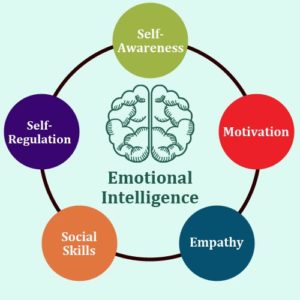The older one gets, the easier it is to fall back on the mistaken assumption that you have all the skills you need to succeed. The tendency is to focus all your energy on getting the job done, assuming that the rest will take care of itself. That’s a big mistake.

We should never stop learning. The moment we think that we are who we are is the moment we give away our concealed potential. The act of learning is every bit as important as what you learn. Believing that you can improve yourself and do things in the future that are beyond your current possibilities is exciting and fulfilling.
These nine skills listed below deliver the largest payoff, both in terms of what they teach you and their tendency to keep the learning growing.
-
Emotional intelligence (EQ)
-
Time management
-
Listening
-
Saying no
-
Asking for help
-
Getting good sleep
-
Knowing when to be quiet
-
Taking initiative
-
Staying positive

Emotional intelligence (EQ) refers to the ability to identify and manage one’s own emotions, as well as the emotions of others. Emotional intelligence includes at least three skills:
— emotional awareness, or the ability to identify and name one’s own emotions;
— the ability to harness those emotions and apply them to tasks like thinking and problem solving; and
— the ability to manage emotions, which includes both regulating one’s own emotions when necessary and helping others to do the same.
It affects how we manage behavior, navigate social complexities, and make personal decisions that achieve positive results. EQ is your ability to recognize and understand emotions in yourself and others and your ability to use this awareness to manage your behavior and relationships.
TalentSmart tested EQ alongside 33 other important workplace skills and found that EQ is the strongest predictor of performance, explaining a full 58% of success in all types of jobs. Increasing your EQ will make you happier and less stressed as well.

One of the biggest things that get in the way of effective time management is the little things that you feel has to be done right. When you function this way, you spend so much time putting out fires that you never get any real work done. Learning to manage your time effectively frees you up to perform at your absolute highest level, and it does so every single day of your life.

A lot of times, we think we’re listening, but we’re actually planning what we’re going to say next. True listening means focusing solely on what the other person is saying by learning how to suspend judgment and focusing on understanding the other person’s input.
There’s so much talking happening at work that opportunities to listen abound. Beyond the spoken words, there’s invaluable information to be deciphered through tone of voice, body language, and what isn’t said. In other words, failing to keep your ears (and eyes) open could leave you out of the game.

Saying no is indeed a major challenge for many people. The more difficulty that you have saying no, the more likely you are to experience stress, burnout, and even depression. No is a powerful word that you should not be afraid to use. Saying no to a new commitment honors your existing commitments and gives you the opportunity to successfully fulfill them. When you learn to say no, you free yourself from unnecessary constraints and free up your time and energy for the important things in life.
It takes a tremendous amount of confidence and humility to admit that you need assistance. This skill is critical because the last thing a leader wants are employees who keep on going down the wrong path because they are too embarrassed or proud to admit that they don’t know what they’re doing. The ability to recognize when you need help, summon up the courage to ask for it, and follow through on that help is an extremely valuable skill.

We’ve always known that quality sleep is good for your brain, but recent research from the University of Rochester demonstrated exactly how so. The study found that when you sleep, your brain removes toxic proteins, which are by-products of neural activity when you’re awake, from its neurons. The catch here is that your brain can only adequately remove these toxic proteins when you have sufficient quality sleep. When you don’t get high-quality deep sleep, the toxic proteins remain in your brain cells, wreaking havoc and ultimately impairing your ability to think—something no amount of caffeine can fix. This slows your ability to process information and solves problems, kills your creativity, and increases your emotional reactivity. Learning to get high-quality sleep on a regular basis is a difficult skill to master, but it pays massive dividends the next day.
It’s human nature to want to prove that you’re right, but it’s rarely effective. In conflict, unchecked emotion makes you dig your heels in and fight the kind of battle that can leave you and the relationship severely damaged. When you read and respond to your emotions, you’re able to choose your battles wisely and only stand your ground when the time is right. The vast majority of the time, means biting your tongue.
In theory, initiative is easy—the desire to take action is always there—but in the real world, other things get in the way. There’s a big difference between knowing what to do and being too scared or lazy to actually do it. That requires initiative. You have to take risks and push yourself out of your comfort zone, until taking initiative is second nature.

It’s hard to find the motivation to focus on the positive when positivity seems like wishful thinking. The real obstacle to positivity is that our brains are hard-wired to look for and focus on threats. This survival mechanism served humankind well, back when we were hunters and gatherers.
However, today, this mechanism brings about pessimism and negativity through the mind’s tendency to wander until it finds a threat. Maintaining positivity is a daily challenge that requires focus and attention. You must be intentional about staying positive if you’re going to overcome the brain’s tendency to focus on threats.
Your time is finite, and you should dedicate yourself to learning skills that will yield the greatest benefit. These nine skills deliver in terms of what they teach you and their tendency to keep the learning growing.
(written by: Whitney)

